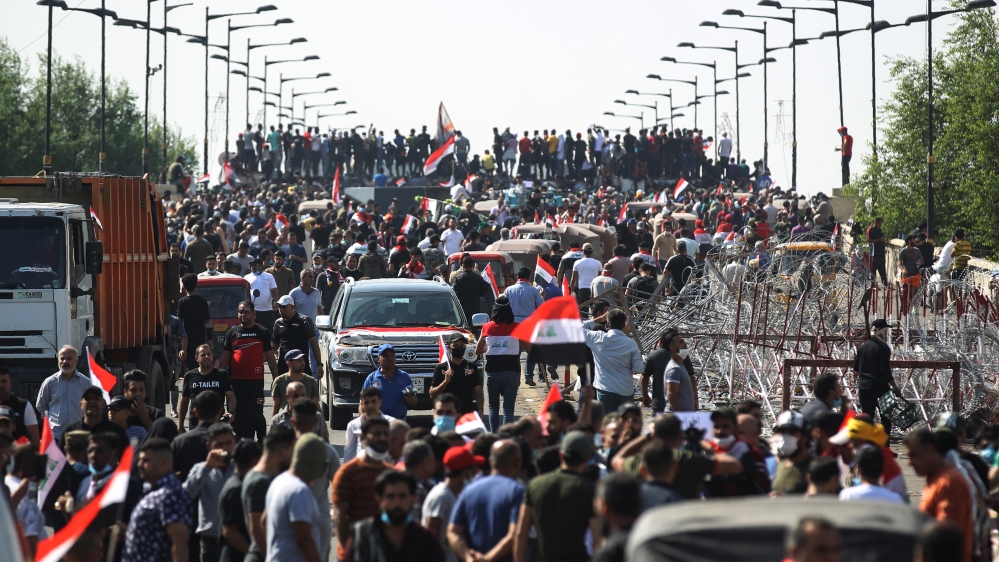Several killed in Iraq as anti-government protests continue
At least six killed in Baghdad and Nasiriya, officials say, as protests continue across the country for a second day.

At least six protesters have been killed in clashes with security forces in Iraq, officials said, pushing the overall death toll in this month’s anti-government protests to more than 190.
Thousands took part in nationwide protests on Saturday, and security forces fired tear gas at demonstrators who tried to reach Baghdad’s Green Zone, home to government offices and embassies.
Keep reading
list of 1 itemThree protesters were killed when they were struck by tear gas canisters in Baghdad, security and medical officials said.
Three others were shot dead in the southern city of Nasiriya after attacking a local official’s home, according to police and medical officials.
Al Jazeera’s Natasha Ghoneim, reporting from Baghdad, said the mood in the city was tense with heavy security forces deployed around the Iraqi capital.
“People here are furious. Some are trying to storm barricades leading to the Green Zone, where government offices and the parliament building are located,” she said.
“They want the government to go. Security forces are using lots of tear gas and stun grenades.”
The rallies have mainly been by young, unemployed men who are protesting against the government and demanding jobs and better services.
“I want change. I want to remove those corrupt people who sleep in the Green Zone and who fired tear gas and rubber bullets at us,” Mukhaled Fares, 19, told the AP news agency.
The protests are a continuation of the economically driven demonstrations that began in early October and turned deadly as security forces cracked down, using live ammunition.
At least 149 people were killed in the protests earlier in October.

The Iraqi commission for human rights said the death toll from Friday’s protests stood at 42. It said more than 2,300 people were wounded.
The Interior Ministry, meanwhile, praised what it called the restraint shown by security forces on Friday.
“The security forces secured the protection of demonstrations and protesters responsibly and with high restraint, by refraining from using firearms or excessive force against demonstrators,” the ministry said in a statement on Saturday.
People gathered at Baghdad’s Tahrir Square said they were struggling to make sense of what they called the security forces’ excessive use of force, claiming all they carried on them were flags and water to fight off tear gas and rinse their eyes.
“Just yesterday, we lost more than 30 men … We need a safe country,” said Batoul, a 21-year-old protester.
“We want to have a life, literally. It’s not about jobs or money, it’s about being in a good country that we deserve. We have a great country, but not a great government,” she told Al Jazeera.

The ongoing turmoil has broken nearly two years of relative stability in Iraq, which in recent years has endured an invasion by the United States and protracted fighting, including against the Islamic State of Iraq and the Levant (ISIL or ISIS) armed group.
The demonstrations have posed the biggest challenge yet to the year-old government of Prime Minister Abdul Mahdi, who has pledged to address demonstrators’ grievances by reshuffling his cabinet and delivering a package of reforms.
The moves have done little to quell the demonstrators, however, whose ire is focused not just on Mahdi’s administration but also Iraq’s wider political establishment, which they say has failed to improve the lives of the country’s citizens.
|
|
Many view the political elite as subservient to one or other of Iraq’s two main allies, the US and Iran – powers they believe are more concerned with wielding regional influence than ordinary Iraqis’ needs.
Nearly three-fifths of Iraq’s 40 million people live on less than six dollars a day, World Bank figures show, despite the country housing the world’s fifth-largest proven reserves of oil.
Sami Hamdi, editor-in-chief of the UK-based International Interest magazine, said Iraq had seen similar mass protests in the past, but they had dissipated because of a lack of leadership.
“And the other dynamic that many or not talking about, which painful to say, is that Iraqi society is itself very divided. Many Iraqi voted in elections across sectarian lines, and therefore it produced a sectarian government. These parties rewarded their loyalists with public sector jobs,” he said.
“While the protesters are united over their basic rights, they are not united over who should give it to them.”